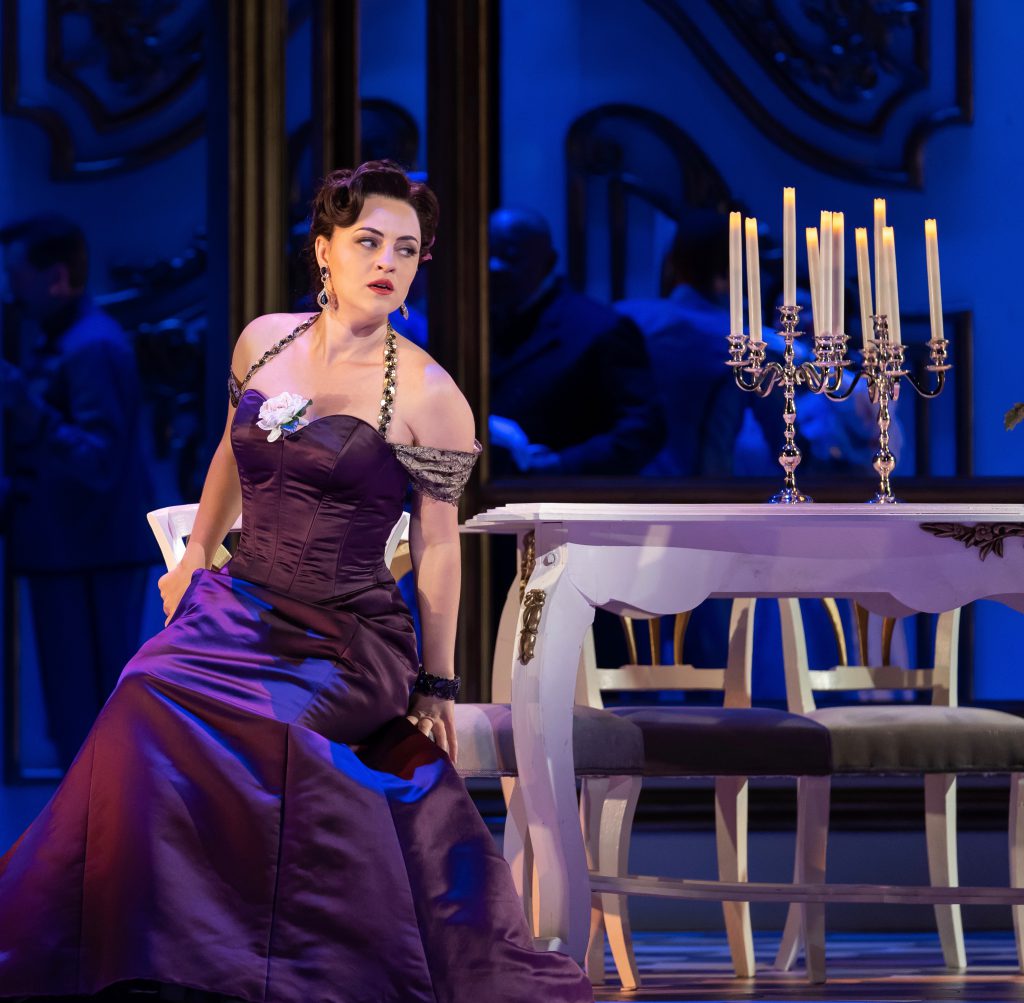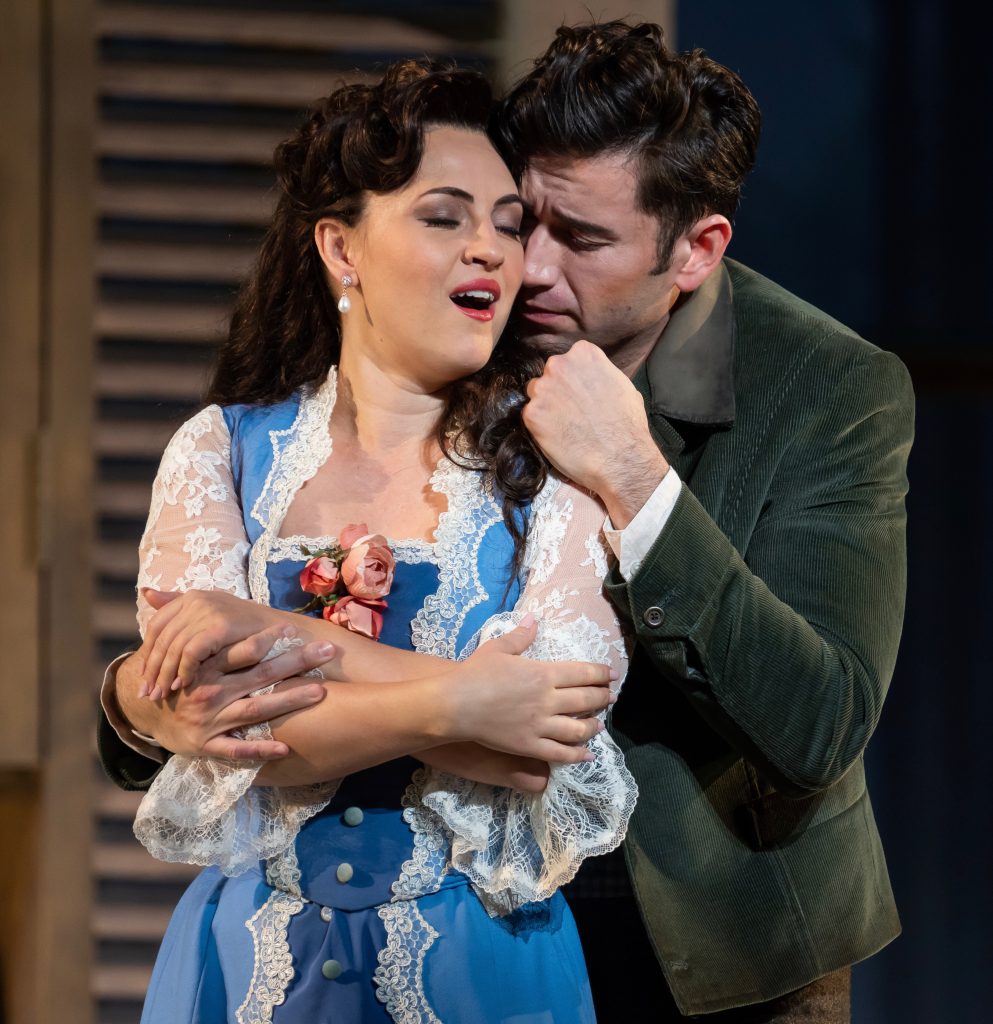An exciting new “Traviata” opens WNO season on high note

Venera Gimadieva is Violetta in Verdi’s “La Traviata” at Washington National Opera. Photo: Scott Suchman
One could be forgiven for not remembering Washington National Opera’s last production of La Traviata. A decade since that rather mediocre 2008 staging, artistic director Francesca Zambello has returned to Verdi’s most popular work in a new production, seen Saturday night at the Kennedy Center Opera House.
Riding on the splendid voice of Venera Gimadieva in the title role and the mercurial conducting of Renato Palumbo, Zambello has gone for a fairly traditional look, slightly updated from the early 19th century to the Belle Époque.
All three principal singers make company debuts in this production. Gimadieva, who had plenty to crow about in her Santa Fe Opera debut in The Golden Cockerel in 2017, was extraordinary as Violetta. Searing high notes, velvety legato, and virginal pianissimo all served the drama of the character, a cynical manipulator of men who is surprised to find love. The Russian soprano’s vocal power and subtle acting provided the gamut of expression from her wide-ranging Act I scena “È strano” to the contained, tragic strains of “Addio del passato” in Act IV, a more heart-breaking moment in this performance than the character’s death. The latter, a hammed-up backwards fall onto a hospital bed, induced more giggles than tears.
Tenor Joshua Guerrero was not quite in the same class, shying away from some of the high notes. But his voice had an irascible, fiery quality that served well for the poet Alfredo’s passion and idealism. He was not always rhythmically stable, though, getting ahead by a measure or so near the opening of the Act I Brindisi, which conductor and orchestra covered for quickly.
As Alfredo’s father, baritone Lucas Meachem was an implacable, immutable force. As stiff as a post in his long coat (handsome costumes designed by Jess Goldstein), Meachem had plenty of vocal snarl to underscore the hypocritical inflexibility of the character’s moral attitudes, as well as a purring legato to make his belated moment of self-realization tender and poignant.

Venera Gimadieva and Joshua Guerrero in “La Traviata.” Photo: Scott Suchman
In the supporting cast WNO fielded the flower of its Domingo-Cafritz Young Artists program, past and present. Potent soprano Alexandra Shiner showed sympathetic devotion as Annina, Violetta’s lady’s maid, while formidable mezzo-soprano Deborah Nansteel and stentorian bass Samuel Weiser, a noteworthy addition to the program, livened up the party scenes as Flora and the Marquis d’Obigny, respectively. The WNO chorus, ably prepared by Steven Gathman, and a modest assortment of dancers with tambourines and suggestive poses (choreography by Parker Esse) made the third act appropriately festive.
Conductor Renato Palumbo was last on the podium of the Kennedy Center Opera House Orchestra in 2007, when he was the best part of an otherwise mixed staging of Verdi’s Macbeth. This score not only breathed under his hands, it gasped and panted. The musicians in the pit sounded confident and expertly balanced from the dramatic, ghostly string opening of the prelude.
Palumbo’s interpretation stripped away every layer of expectation, setting bold tempos and moving in ways equally fluid and jarring. Some key phrases were allowed luxuriant rubato and pauses, in order for a significant line to sink in; at other times he exploded with wild gestures, lashing the tempo forward. Even in such a familiar score, much of the music felt newly fashioned.
Zambello’s staging appears to be transposed to the late 19th or early 20th century, but Verdi wanted this opera to take place in the present when he created it. A pair of heavily mascara-marked eyes on a stage-covering scrim, reminiscent of 1950s movies presided over much of the action. The death scene, prefigured in action during the serenely played Prelude, takes place in a white-toned tubercular ward, attended by nuns in large wimples. At the end of that scene, Violetta leaps up from bed in a vibrant gown into Act I.
Peter J. Davison’s set featured an elegant wall of turning triangular louvers, each side painted to evoke different backgrounds. In Act II, that backdrop disappeared, revealing a mist-filled forest scene. To complete the picture of Violetta and Alfredo’s love nest as a hunting chateau in the forests of the Parisian suburbs, a hunter supernumerary crossed the stage with a dead pheasant and two obedient bird dogs, to the audience’s audible delight. Other pieces flew in and out to enhance different scenes, and rich, cinematic lighting in lurid purple and red accented the sin-filled party scenes (designed by Mark McCullough).
La Traviata runs through October 21. The first cast will perform on all dates except 2 p.m. October 7 and 14 and 7 p.m. October 20, when Jacqueline Echols, Mario Chang, and Michael Chioldi take over the principal roles. kennedy-center.org; 202-467-4600

Posted Oct 08, 2018 at 9:45 am by Opera Buffa
I agree that Venera Gimadieva is simply splendid.
I was less taken with the sanatorium scenes during the overture and the end of ACT 1, complete with a corpse being removed. A little heavy handed, ‘Cesca?
But the music is so powerful, and when sung with Gimadieva’s artistry, Trav will survive any director’s urge to make a personal mark.
Let’s hope she returns to DC soon.
Posted Oct 21, 2018 at 7:39 pm by William Neyman
Lucas Meachem, in the unsympathetic role of Alfredo’s father Giorgio, was splendid — perfectly suited to the role, and, to my mind, quite the most exciting voice in the cast, overshadowing even the vocal pyrotechnics of Gimadieva with the power of his dark and menacing baritone.